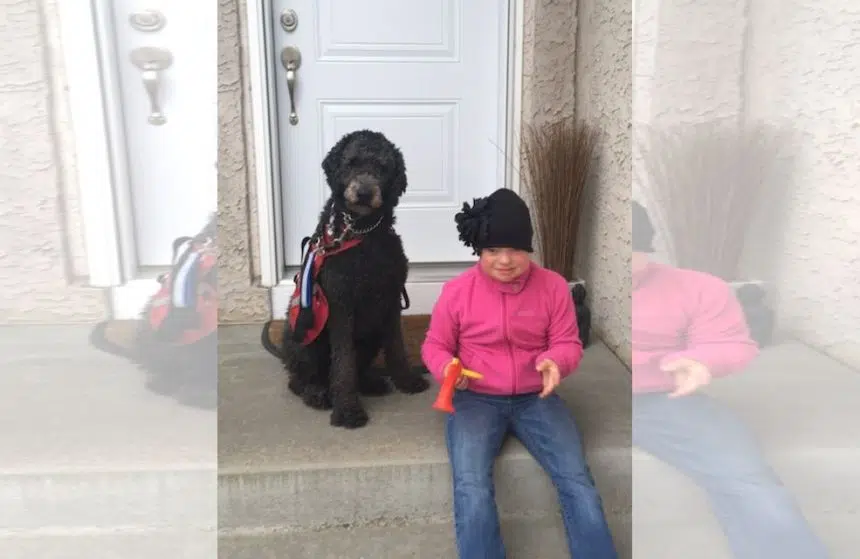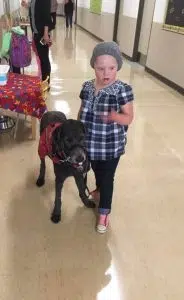Libby Giesbrecht
Dec 14, 2021 | 8:12 AM

A poodle completely changed what life looks like for one Warman family.
When Sheri Zwack was pregnant with her daughter Olivia, ultrasounds didn't show Olivia's heart condition or Down syndrome. She wasn't diagnosed with autism until later.
"Autism is the one that is the biggest struggle with us, I think, because connecting to the world is a hard thing for her," Zwack reflected.
"She can't talk, she kind of says words here or there but it's random stuff that doesn't make sense. She's not potty-trained, she needs one-to-one (help), like she was bolting," Zwack said.
Zwack said it's common for children with autism to struggle with safety, to have the urge to run away and to be attracted to water. The family has extra locks and deadbolts on many of their doors, out of Olivia's reach.
Zwack remembered one day when Olivia ran away from daycare. That day, Zwack got a call from the RCMP that Olivia had been found at a manmade lake.
"That was hard," Zwack said, tearing up.
When police located the girl, she hadn't been able to answer their questions or tell them who she was.
"How does she tell someone (her name)?" Zwack wondered.
A friend of Zwack's was fortunately part of the search team that found Olivia that day and recognized her. But it made Zwack fear for what could happen.
That led the Zwacks to get Ivan, Olivia's service dog. He's tethered to her most of the time and works to calm Olivia in various situations.
George Leonard, head trainer and a certified master dog trainer for MSAR Service Dogs in Winnipeg, said getting a service dog can make all the difference with a child who has autism.
It can mean significant peace of mind for parents whose children bolt, especially.
"Once the dog bonds with the child, the kid doesn't want to go anywhere, because he's got his dog. He really doesn't run," Leonard said.
Leonard said MSAR is one of the few organizations that trains any type of service dog, from those that help with PTSD to Down syndrome and autism, to mobility concerns.
For a girl like Olivia, who has both Down syndrome and autism, introducing Ivan to their family meant her mother could finally take a small step back.
"The mother is not the (service dog)," Leonard agreed, adding families he has spoken to have felt this freedom come with getting a service dog themselves. "It has changed their life."
A service dog for anyone can mean more independence, but with kids who have autism, Leonard has seen children become more outward and go to school with confidence.
"It's night and day, just the confidence in the child," Leonard said of a family he met with recently. "They're moving forward, they want to go do things, they're proud to be with their dog, they're happy to be with their dog."
]Finding the right fit
The first thing to do if considering a service dog is to consult with a medical professional, Leonard said. Only they can provide the diagnosis that someone would benefit from a medical apparatus — also known as a service dog.
"Once you get that, I would then try to talk you out of it," Leonard stated.
The commitment to a service dog is significant and one that will change a life. Leonard will often interview families to find out what treatments and alternatives they've tried in the past and where they are in terms of development.
Leonard said it isn't a process to rush.
"It's a huge commitment financially and time-wise, so you want to make sure there's other things you've tried before you go and get a dog," he explained.
It also isn't a fail-safe solution for every family.
"If you've met one autistic child, you've met one — because they're all different," he said.
If Leonard and the family agree to move forward with the process to get a service dog, he'll then interview the family to better understand their needs and how a dog could be trained to help.
A dog will start its training around eight to 10 weeks old, spending the first few months running around outside and getting socialized. Training them begins with public access until around nine months, when trainers will start conditioning them to tasks to determine if a dog is doing what they hope it will.
Leonard said he'll often see tendencies in a pup that might indicate they'd be good at one form of therapy over another — a strong anchor dog with "impeccable balance in public," for instance, would make for good autism support.
For this reason, dogs are tailored to a family but specific puppies won't be designated until their training shows they'll be successful in the needed specialties. Leonard explained there's about a 60 per cent pass rate for autism dogs.
When the dog is a year old, they'll be introduced to their future family. They work with the family and trainer until they're around two years old before they become completely certified with their person to support them full-time.
Leonard said he has only had to rehome a dog a handful of times in his career as a trainer. When a service dog hasn't worked with a family, it usually has to do with the family not being supportive of the dog or their child not engaging with the animal.
The other concern would be children who have severe violent tendencies.
"If the child is violent and reactive, it's going to be pretty hard for a dog to bond with that," Leonard said.
Dec 14, 2021 | 8:12 AM

A poodle completely changed what life looks like for one Warman family.
When Sheri Zwack was pregnant with her daughter Olivia, ultrasounds didn't show Olivia's heart condition or Down syndrome. She wasn't diagnosed with autism until later.
"Autism is the one that is the biggest struggle with us, I think, because connecting to the world is a hard thing for her," Zwack reflected.
"She can't talk, she kind of says words here or there but it's random stuff that doesn't make sense. She's not potty-trained, she needs one-to-one (help), like she was bolting," Zwack said.
Zwack said it's common for children with autism to struggle with safety, to have the urge to run away and to be attracted to water. The family has extra locks and deadbolts on many of their doors, out of Olivia's reach.
Zwack remembered one day when Olivia ran away from daycare. That day, Zwack got a call from the RCMP that Olivia had been found at a manmade lake.
"That was hard," Zwack said, tearing up.
When police located the girl, she hadn't been able to answer their questions or tell them who she was.
"How does she tell someone (her name)?" Zwack wondered.
A friend of Zwack's was fortunately part of the search team that found Olivia that day and recognized her. But it made Zwack fear for what could happen.
That led the Zwacks to get Ivan, Olivia's service dog. He's tethered to her most of the time and works to calm Olivia in various situations.
George Leonard, head trainer and a certified master dog trainer for MSAR Service Dogs in Winnipeg, said getting a service dog can make all the difference with a child who has autism.
It can mean significant peace of mind for parents whose children bolt, especially.
"Once the dog bonds with the child, the kid doesn't want to go anywhere, because he's got his dog. He really doesn't run," Leonard said.
Leonard said MSAR is one of the few organizations that trains any type of service dog, from those that help with PTSD to Down syndrome and autism, to mobility concerns.
For a girl like Olivia, who has both Down syndrome and autism, introducing Ivan to their family meant her mother could finally take a small step back.
"The mother is not the (service dog)," Leonard agreed, adding families he has spoken to have felt this freedom come with getting a service dog themselves. "It has changed their life."
A service dog for anyone can mean more independence, but with kids who have autism, Leonard has seen children become more outward and go to school with confidence.
"It's night and day, just the confidence in the child," Leonard said of a family he met with recently. "They're moving forward, they want to go do things, they're proud to be with their dog, they're happy to be with their dog."
]Finding the right fit
The first thing to do if considering a service dog is to consult with a medical professional, Leonard said. Only they can provide the diagnosis that someone would benefit from a medical apparatus — also known as a service dog.
"Once you get that, I would then try to talk you out of it," Leonard stated.
The commitment to a service dog is significant and one that will change a life. Leonard will often interview families to find out what treatments and alternatives they've tried in the past and where they are in terms of development.
Leonard said it isn't a process to rush.
"It's a huge commitment financially and time-wise, so you want to make sure there's other things you've tried before you go and get a dog," he explained.
It also isn't a fail-safe solution for every family.
"If you've met one autistic child, you've met one — because they're all different," he said.
If Leonard and the family agree to move forward with the process to get a service dog, he'll then interview the family to better understand their needs and how a dog could be trained to help.
A dog will start its training around eight to 10 weeks old, spending the first few months running around outside and getting socialized. Training them begins with public access until around nine months, when trainers will start conditioning them to tasks to determine if a dog is doing what they hope it will.
Leonard said he'll often see tendencies in a pup that might indicate they'd be good at one form of therapy over another — a strong anchor dog with "impeccable balance in public," for instance, would make for good autism support.
For this reason, dogs are tailored to a family but specific puppies won't be designated until their training shows they'll be successful in the needed specialties. Leonard explained there's about a 60 per cent pass rate for autism dogs.
When the dog is a year old, they'll be introduced to their future family. They work with the family and trainer until they're around two years old before they become completely certified with their person to support them full-time.
Leonard said he has only had to rehome a dog a handful of times in his career as a trainer. When a service dog hasn't worked with a family, it usually has to do with the family not being supportive of the dog or their child not engaging with the animal.
The other concern would be children who have severe violent tendencies.
"If the child is violent and reactive, it's going to be pretty hard for a dog to bond with that," Leonard said.












